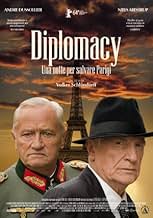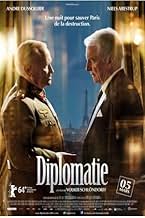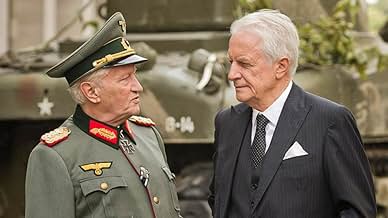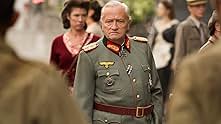Ein Geschichtsdrama, das die Beziehung zwischen Dietrich von Choltitz, dem deutschen Militärgouverneur im besetzten Paris, und dem schwedischen Generalkonsul Raoul Nordling schildert.Ein Geschichtsdrama, das die Beziehung zwischen Dietrich von Choltitz, dem deutschen Militärgouverneur im besetzten Paris, und dem schwedischen Generalkonsul Raoul Nordling schildert.Ein Geschichtsdrama, das die Beziehung zwischen Dietrich von Choltitz, dem deutschen Militärgouverneur im besetzten Paris, und dem schwedischen Generalkonsul Raoul Nordling schildert.
- Auszeichnungen
- 5 Gewinne & 6 Nominierungen insgesamt
- Opérateur radio
- (as Pierre-Marie Rochefort)
Empfohlene Bewertungen
Acting is excellent by both principal actors, and other actors as well.
If you are a World War II buff this is a must see for you, but I strongly recommend that you see this film anyways, because it is just short of a masterpiece.
I went into the film with little to no knowledge on the production beforehand (ie. the actors, director, producer, scenarist) and hence, what type of film to expect, e.g. more of a "Is Paris Burning?" (1966) or a "Downfall (Der Untergang)" (2004)?, with only a vague knowledge of the subject itself plus a vague memory of reading the synopsis from the Berlinale catalogue.
Originally a play, this screen adaptation tells a fictionalized* account of the negotiations between Dietrich von Choltitz, the German General and Governor of Paris, and Raoul Nordling, the Swedish consul-general, at Hotel Meurice, the headquarters of the former on the eve of The Liberation of Paris in 1944.
It is a dialogue-driven film with very few cuts between different scenes, characters and events and maintains a very fine and serenely intriguing pace with a good script and a focus on the interplay between the main characters.
The script shines with brilliant moments of reason and questioning where humble, thought provoking and beautifully humane concepts are elegantly waved into the dialogues.
Without giving spoilers, one such particular moment was the question of future cohabitation and peace between two peoples, which I found to be the strongest and the most haunting point raised in the entire film. Clearly, the script was written to haunt the viewers with similar notes of contemplation.
However, intentions aside, the backbone of the film is the solid acting by André Dussollier (Raoul Nordling) with his ever so slightly and mischievously probing and also understandably desperate demeanor (with a devilish resemblance, as my girlfriend put it -a very fitting impression I find) and Niels Arestrup's (von Choltitz) stoic and war-worn cynicism while effortlessly switching between German and French, adding to the phonetic richness of the picture, not to forget the few if brief appearances by others. Quality of acting keeps the film together above all else and despite its flaws.
So I was quite very pleased with it during and immediately after viewing and some of the things one might call shortcomings or flaws didn't become immediately apparent to me (though they quite very much did to my girlfriend, who was quick to remind me of those).
I haven't seen the play so maybe this will be an inaccurate impression as I can't compare but it feels as though little work has been put into the script to adapt it for camera and screen or whatever effort was made, it didn't quite manage to step out of the comfort zone of theatrical traditions, to build a cinematic identity of its own.
You can tell as devices most often saved for theatrics creep into the film in manners that stick out where the lack of more convincing cinematic adaptations leave their traces.
One such particular moment was of Parisian romanticism which I felt was lifted straight from a stage performance where it would fit right in and easily find resonance with the viewers but ended up rather disconnected and overblown in the cinematic context of the film.
Likewise with introductory expositions and small editing touches reminiscent of use of prerecorded medium in theatre which didn't quite line up with the rest of the film and ended up feeling rather amateurish.
To compare to other "Chamber Play" films, it is not as dramatically tense and conflict-driven as Twelve Angry Men or, say, filled with as much suspenseful characterization and camera-work as Der Untergang. The film doesn't concern itself with so much suspense and drama to progress the plot but with intelligent questions that aim to haunt and beg to be contemplated in a serene state of mind which, I find, is where the film attempted to be and could have been the strongest and is intellectually the most significant.
That the quality of acting ended up as the strongest suit of the film, doing most of the heavy work to carry the film with all of its flaws sadly leaves it at a place short of being a classic.
Then again, what do I know?
(*: Fictionalized though still anchored in memoirs, apparently. For instance, you will find that a lot of moments from the film line up perfectly with the accounts of a particular article authored by a Kelly Bell, published online in August 19, 1996 by a World War II Magazine -src: http://goo.gl/KIFTi0 -, presumably both drawing from the 1965 novel "Is Paris Burning?" which I haven't read. -mind that the specific parallels between the film's script and the article will inevitably act as spoilers)
That actually comes up in this film, "Diplomatie," from 2014, based on a play. It's basically a two-person movie about the conversation Swedish consulate Raoul Nordling (André Dussollier) has with Général von Choltitz (Niels Arestrup).
Germany has basically lost the war; the Allies are en route to Germany, and Hitler has decided to make Paris scorched earth, killing millions and razing the city to rubble. There was no strategic reason to do this. He was just feeling especially spiteful that day and figuring, why leave the Allies with this jewel.
Nordling, a Paris resident, comes to ask von Choltitz to spare Paris. Von Choltitz has never defied an order, no matter how he felt about it, and he is very dismissive of Nordling. He points out that there's practically nothing left of Hamburg - did those civilians not matter?
He tells Nordling that the Parisians gave the Nazis Paris "with their legs open - like whores. We can do what we want with it." They go back and forth on this, and von Choltitz later admits that Hitler has gone off the rails. But there's nothing he can do - his family will pay the price if he doesn't do as he's told.
This is an excellent film with superb acting by both men. The most chilling scene takes place in the beginning, when von Choltitz and soldiers go over the plan to destroy Paris. It's absolutely shocking. They go through every landmark, every famous street, discussing how it will be taken down, how the city will be flooded when they break through the river barriers. It's awful.
I knew right away that Neils Arestup was not German - I could understand every word he said. When real Germans speak, I can't. He does a masterful job, so aggressive and cold in the beginning, and then gradually weakening. André Dussollier, with his quiet performance, is excellent in his persuasiveness.
I believe the mayor of Paris and Nordling both visited von Choltitz.
Well, we all know what happened. Here in the U. S., I think sometimes World War II has been glamorized a bit as it was not fought on our soil.
For many of our fathers, it was their first time away from home and their normal lives. In reminiscing, for an 18-year-old who maybe went over at the end of the war, it was an adventure and the beginning of lifelong friendships. Sadly the outcome was not the same for all.
World War II was filthy, it wasn't the propaganda movies trying to keep our spirits up. It was a horrible war that killed many people through bombing, extermination, and starvation. For much of Europe, the aftermath wasn't that much better.
"Diplomate" is just a microcosm of one man's efforts to stop the carnage. Definitely worth seeing.
Several comments: this movie is directed by none other than legendary German film maker Volker Schlöndorff, yes he of "The Tin Drum" from the late 1970s. Who knew he was still around and making movies? Second, while on some occasions there are scenes shot outside, beware that most of the movie takes place in the room at the Hotel Meurice where General von Scholtitz is based, and it truly needs to be emphasized that this is a theatre play brought to the big screen, but still very much a theatre play. Last but certainly not least, the acting performances of the two lead actors (André Dussollier as Raoul Nordling, and Niels Arestrup as General von Choltitz) are nothing short of top-notch and truly carry the film.
"Diplomatie" has garnered rave reviews in Europe, and the screening I saw this at in Antwerp, Belgium last week during a recent family visit, was very well attended. Still, I don't know to what extent this success could be replicated in the US. For me, the movie was a slight bit too static to fully engage me from start to finish. But I would readily suggest that you check this movie out if you get the chance, and draw your own conclusions.
Wusstest du schon
- Zitate
Général von Choltitz: Do you know what we do to men like you?
Raoul Nordling: Give them a medal?
Général von Choltitz: [breaking a smile] Yes, on occasion.
[stern again]
Général von Choltitz: Posthumously.
- VerbindungenFeatured in Diplomatie: Making of (2015)
- SoundtracksLa 7ème symphonie
Music by Ludwig van Beethoven (as Beethoven)
Conducted by Wilhelm Furtwängler
Berlin 1943 © Société Wilhelm Furtwängler
Performed by Berliner Philharmoniker (uncredited)
Top-Auswahl
Details
- Erscheinungsdatum
- Herkunftsländer
- Offizieller Standort
- Sprachen
- Auch bekannt als
- Diplomacy
- Drehorte
- Jardin des Tuileries, Paris 1, Paris, Frankreich(city park in front of the hotel)
- Produktionsfirmen
- Weitere beteiligte Unternehmen bei IMDbPro anzeigen
Box Office
- Bruttoertrag in den USA und Kanada
- 230.880 $
- Eröffnungswochenende in den USA und in Kanada
- 8.518 $
- 19. Okt. 2014
- Weltweiter Bruttoertrag
- 4.207.242 $
- Laufzeit1 Stunde 24 Minuten
- Farbe
- Sound-Mix
- Seitenverhältnis
- 2.35 : 1




























